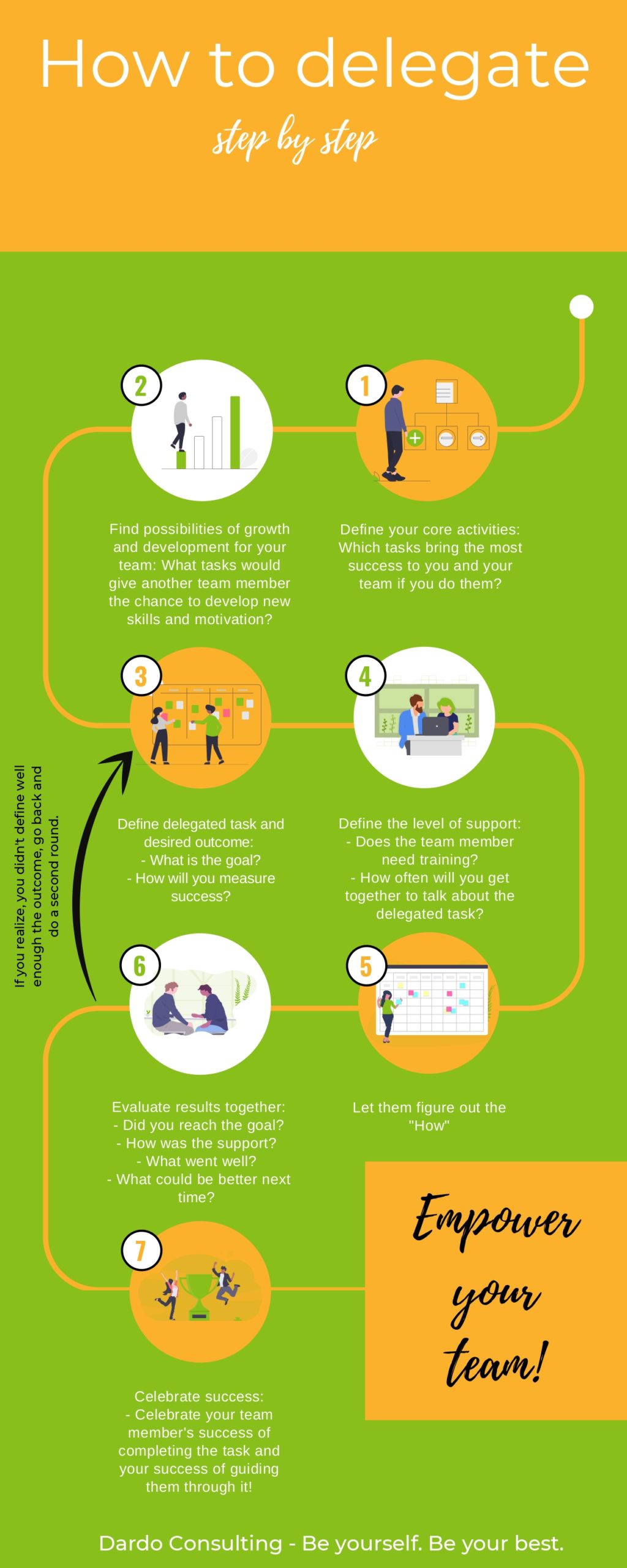Do you find it difficult to delegate as a leader? Do you not want to bother your team? Do you think it’s quicker if you just do it? Do you want to keep unliked tasks on your to-do-list to not demotivate any team member? Do you kind of like to be the go-to expert and don’t want to lose influence and status?
What I often find when talking about that in leadership coaching is that leaders have not defined what makes them successful in their leadership role. The traditional concept is telling leaders they are responsible for the results of their team. But what if you changed that definition to the following: Leaders are responsible for the people who responsible for the result? This changed point of view can make it much easier for you to delegate. Let’s compare the 2 definitions a bit more detailed:
My main criteria for success as a leader are the results of the team.
What is a leader going to do if you tell them they are responsible for the result of the team? They will be more likely to:
- do it themselves because they are quicker and better doing it.
- not trust team members with tasks.
- not take the time to develop their team members and just focus on the result.
- burn out.
- react negatively to mistakes their team members make.
- have difficult relationships with their team members.
- have more conflict in their team.
- have higher fluctuation rates.
My main criteria for success as a leader is the growth and the development of my team members.
A leader whose success is defined by how much their team members grow and develop is more likely to:
- take the time to train and develop their team members.
- build a culture of trust.
- take time to get to know their team members.
- find out what motivates their team members.
- find out and develop further the strengths of the team members.
- be comfortable with new experts forming on their team.
- be happy for their team member’s success.
- have good relationships with their team.
- have lower fluctuation rates.
- have higher loyalty on their team.
- have higher job satisfaction on their team.
Delegation basics: Find out what kind of leader you want to be
Would you prefer being on the team of someone who defines their success by the output of the team? Or someone who defines their success but how much you grow and develop and how well they provide you the conditions to do a great job?
Decide for yourself what kind of leader do you want to be.
Once you have decided for yourself what kind of leader you want to be, you can start delegating. Below you find an example of a workflow for delegating:
How to delegate step by step
1. Define your core activities
Go through your projects and tasks and mark those who are NOT your core-activities. What are core-activities? Core activities are tasks that bring the most success for you, your team, and your company if they are done by you. They are tasks that are the best fit for your skills and experience. Do not delegate your core-activities unless you are the only person with that specific skill-set and you are looking for building someone else up (which makes sense if you are the single resource for that topic).
2. Find chances of empowerment and growth for your team
Now go with your list of tasks and talk to your team. You can have a team workshop or individual meetings. Find out who would like to have the possibility to take over some of your tasks to grow and learn. Always think as a team: We as a team need to do tasks A, B, C. How do we divide them up to make sure they get done the best way possible and each team member is motivated and has fun at work?
Really talk to your team about it. I often experience leaders taking over tasks that they don’t like because they assume no one likes them. When we talk to the team about it often there is someone who would love those tasks. So the so thought protection turns out to be a missed opportunity for growth and fun for someone else.
3. Define the delegated tasks and their desired outcome
If you delegate a task or a project to someone you have 2 options: Hand it to them entirely, meaning that they are responsible for the outcome and everything that comes with it. Or: Defining how the outcome should look like. Be as specific as possible. How will you know they did a good job? How will you measure success? It has to be very clear to you both how the end result has to look like.
4. Define the level of support
To reach the desired outcome, make sure the team member already has all the skills needed to complete the task. If not, define how the team member will acquire the skills needed. Will you coach them? Will somebody else from the team or the company teach them? Will they get external training?
Also, define how often you will check in with them to evaluate the stage of the task. What I would advise you to do, is to agree on a certain time frame (e.g. once a week or once a month) and offer that they can always come to you if they wish to have support. That way you get to know early on if something is not going well, they feel supported and trusted. There is nothing more demotivating than a leader who is micromanaging and asking every day how the task is coming along. Let them decide how much they need you.
5. Let them figure out the “how”
If you defined what the end result should be, give them the freedom to decide how to get there. If they ask you for help, help. If not, let them figure it out by themselves. They may not exactly do it as you would do it. And that’s ok. They will either learn or surprise you with an even better or faster way to get to the finish line.
6. Evaluate the results together
Some questions to go through together:
- How was this process for you as a leader? How was this process for your team member?
- What went well?
- What could be even better next time?
- How was the support you provided?
- Did you do something that helped? Did you do something that made it more difficult to get the job done?
- Did they reach the desired outcome?
- How was communication and information throughout the process?
- Did the task fit the skills or is more training needed?
7. Celebrate
You did it! Celebrate with your team member the successful delegation and empowerment! Take time to see what went well and how this cooperation made the team and the company better. Enjoy that you were able to empower your team member to grow and develop!
8. Start the cycle over: Find a new task or project to hand over
The more often you do this, the easier it gets. Go from time to time through your task list and ask your team members to do the same. Check if there are tasks that would be better done by someone else.
Delegation is empowerment. One of the biggest factors for life happiness is growth. Feeling you are at a different/better point than 5 years ago. Being responsible for new tasks lets employees train new skills, grow, and get to know new strengths. And it gives you the possibility to shine as a leader by being the person who coaches them through it and makes them better.



Responses